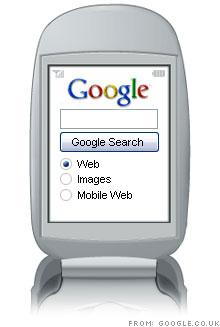Tech, telcos, ready to rumble?With Google getting into the wireless game, a burgeoning rivalry could get ugly, says Fortune's Stephanie N. Mehta.NEW YORK (Fortune) -- Every so often, a really great, sustained rivalry comes along. In the 1970s and 1980s we had the Los Angeles Lakers versus the Boston Celtics. In the 1990s, East Coast rappers dueled their West Coast counterparts. More recently the nation was transfixed by the Paris Hilton-Nicole Richie fight. Now comes a clash of industries so momentous it threatens to make those other feuds look positively tame. We're talking about the brewing battle between phone companies such as AT&T (Charts) and Verizon (Charts, Fortune 500), and technology companies, specifically Internet-oriented companies such as Google (Charts, Fortune 500) and eBay (Charts, Fortune 500).
The reasons for the rivalry are complex and myriad, but it essentially boils down to a classic struggle between content players and distributors for the hearts, minds and wallets of American consumers - all with a digital twist. And the twist is this: Internet companies would like telecom networks, wireless networks in particular, to be more "Internet-like," meaning they'll begin to migrate away from a so-called walled garden approach on their wireless networks, and use the mobile Web as freely as they do on a PC. Already carriers in Europe, such as Vodafone, are taking steps to break down such walls, letting customers access general Web content without having to go through the carrier-operated portals. The tech-telco throwdown has manifested itself in several ways. Early last year there was a hearty debate over Net neutrality legislation, which sought to regulate the Internet by prohibiting phone and cable companies from limiting or prioritizing Web traffic on their wired broadband networks. A few Silicon Valley-born, venture-backed companies such as M2Z (short for "Move to Zero") now are seeking to become broadband network operators, arguing they can do it better and cheaper than the incumbent phone companies. But the biggest and most interesting salvo in the tech v. telecom fight is Google's potential bid for wireless spectrum, and its rumored development of wireless handsets. Google CEO Eric Schmidt earlier this month told a group of regulators and communications lobbyists that the company probably would bid for wireless licenses in an upcoming auction of spectrum in the 700 Mhz band, presumably in the hopes of building the nation's fifth nationwide wireless network. (Verizon Wireless, AT&T, Sprint Nextel (Charts, Fortune 500) and T-Mobile operate nationwide networks today.) In a related move, Google is widely rumored to be developing its own wireless handset. The would-be device, which Google has not confirmed, has been dubbed "Gphone" by some bloggers, a nod to Apple's (Charts, Fortune 500) critically acclaimed iPhone. Google has acknowledged a strong interest in moving its search applications and other content onto mobile phones, where it hopes to command premium prices for super-targeted advertising. (If you're searching for pizza places on your mobile phone, you're probably hungry right this minute, making you an ideal marketing target for a local restaurateur.) And Google has been working with carriers and handset makers to get Google's maps, mail and other applications on mobile phones. But by thinking about bidding on licenses - and possibly deploying its own handsets - Google clearly must be thinking about ways to end-run the traditional telecommunications infrastructure. (Consumers without Web browsers in their mobile phones typically access mobile data through a "deck" of services controlled or selected by their phone company.) Technology and telecom companies "are trying to leverage their existing strengths to get to a dominant position in the wireless value chain," says Blair Levin, a managing director at Stifel Nicholas, and a former Federal Communications Commission official. "Google is about applications, and it is trying to make sure the network operators don't dominate the field and keep its searches away from the consumer." And whether Google ends up bidding on wireless licenses or not, the existing wireless operators are certainly going to have to get used to more competition: A joint venture of cable operators last year acquired wireless licenses, and cellular pioneer Craig McCaw's Clearwire also is building a nationwide broadband system. But that doesn't mean the phone companies are going to cede market share and customer relationships without a fight. They're no fans of companies seeking free or low-cost spectrum from the FCC in exchange for promises of offering cheap broadband, and they've long argued that their ownership of networks gives them the right (or responsibility) to only allow authorized devices on their networks, thereby limiting customer choice of handsets. And though it certainly seems tech companies have momentum now in driving change, it is very likely that any tech company that tries to get into the telecom space may find it needs to change, too. (More on that in next week's column.) "All these things - Net neutrality, Google's interest in the 700 Megahertz auctions - these are all examples of the collision of technology and the communications sector," says Scott Cleland, a self-described "tech-com" analyst who clearly is aligned with the communications camp. "If you think of two cars colliding, one car can take the other in a different direction, but sometimes, they both take each other in an entirely new direction." |
Sponsors
|

